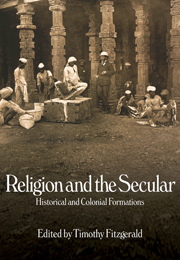Book contents
- Frontmatter
- Dedication
- Contents
- Acknowledgements
- Contributors
- Introduction
- 1 Dialectics of conversion: Las Casas and Maya colonial Congregación
- 2 A higher ground: the secular knowledge of objects of religious devotion
- 3 Secularizing the land: the impact of the Alaskan Native Claims Settlement Act on indigenous understandings of land
- 4 The formative process of State Shinto in relation to the Westernization of Japan: the concept of ‘religion’ and ‘Shinto’
- 5 Religious and secular in the Vietnam War: the emergence of highland ethno-nationalism
- 6 Colonialism all the way down? Religion and the secular in early modern writing on south India
- 7 Understanding politics through performance in colonial and postcolonial India
- 8 Real and imagined: imperial inventions of religion in colonial southern Africa
- 9 Religion in modern Islamic thought and practice
- 10 Rudolf Otto, cultural colonialism and the ‘discovery’ of the holy
- 11 Encompassing Religion, privatized religions and the invention of modern politics
- 12 Colonialism and the myth of religious violence
- Index
6 - Colonialism all the way down? Religion and the secular in early modern writing on south India
- Frontmatter
- Dedication
- Contents
- Acknowledgements
- Contributors
- Introduction
- 1 Dialectics of conversion: Las Casas and Maya colonial Congregación
- 2 A higher ground: the secular knowledge of objects of religious devotion
- 3 Secularizing the land: the impact of the Alaskan Native Claims Settlement Act on indigenous understandings of land
- 4 The formative process of State Shinto in relation to the Westernization of Japan: the concept of ‘religion’ and ‘Shinto’
- 5 Religious and secular in the Vietnam War: the emergence of highland ethno-nationalism
- 6 Colonialism all the way down? Religion and the secular in early modern writing on south India
- 7 Understanding politics through performance in colonial and postcolonial India
- 8 Real and imagined: imperial inventions of religion in colonial southern Africa
- 9 Religion in modern Islamic thought and practice
- 10 Rudolf Otto, cultural colonialism and the ‘discovery’ of the holy
- 11 Encompassing Religion, privatized religions and the invention of modern politics
- 12 Colonialism and the myth of religious violence
- Index
Summary
Recent historiography of colonialism has emphasized that the colonial encounter was not merely an arena in which ideas originating in the European metropolis were projected and forcibly imposed on the colonized, but rather a process in which those ideas took their modern shape through the actions of both colonizer and colonized. Although scholars have begun to attend to the colonial context in which the category ‘religion’, and its corollary, the ‘secular’, acquired their modern sense, the significance of colonialism for the production and deployment of the categorial distinction is more often asserted than demonstrated. One colonial context where the religion-secular distinction was explicitly invoked as an element of policy on the part of a colonial power was in India, where the East India Company, and later the British Crown, maintained a policy of non-intervention in the religious affairs of its colonial subjects that was predicated upon the distinction. The policy was extensively debated in the early nineteenth century in relation to issues such as the banning of satī and the toleration of Christian missions in Company territory. Arguably the most consequential deployment of the religion-secular distinction during the colonial period in India, however, was in relation to caste.
In his recent work on caste Nicholas Dirks has advanced an important argument that suggests that the analysis of caste as a religious, rather than a political, institution was not merely convenient for the British but a necessary instrument of the very specific form of indirect rule that the British exercised in India.
- Type
- Chapter
- Information
- Religion and the SecularHistorical and Colonial Formations, pp. 117 - 134Publisher: Acumen PublishingPrint publication year: 2007

